Joaquin ‘El Chapo’ Guzman: Most-wanted drug lord suspected dead in shootout (VIDEO)
This 10 July, 1993, file photo shows drug trafficker Joaquin Guzman Loera ‘El Chapo Guzman’ at the Almoloya de Juarez, Mexico, maximum security prison. Mexican authorities announced that Guzman escaped 20 January, 2001, the Puente Grande, Jalisco, maximum security prison.
LIMA, Peru — Most-wanted drug lord Joaquin "El Chapo" Guzman is suspected to be dead after a shootout in Guatemala near the Mexican border.
Guatemalan authorities said Friday they are investigating the possibility a man killed in the shootout was 58-year-old Guzman, but later backtracked, saying they hadn't yet located a body or even confirmed there was a gunfight, the Associated Press reported.
If confirmed, the death of Guzman could be the highest-profile blow to the international cocaine trade since Colombian drug kingpin Pablo Escobar died in a hail of bullets in a shootout with security forces in Medellin in 1992.
More from GlobalPost: Legalize it? Latin America pushes to turn the page on drug war
As head of the ruthless Sinaloa cartel, Guzman, said to have amassed a personal fortune of $1 billion, is thought to be responsible for the deaths of thousands, mainly in Mexico but also in the US and elsewhere in Latin America.
Forbes recently him the world’s 63rd most-powerful person and is widely viewed as the Western Hemisphere’s most-wanted criminal.
Indeed, many analysts now believe Guzman is a more powerful and dangerous operator than Escobar ever was.
That is in part because under his ruthless leadership the Sinaloa cartel has achieved what experts call “vertical integration” of the cocaine supply chain, with its tentacles stretching from the remote Andean regions where coca is grown into the heart of the world’s largest cocaine market — the United States.
The US Drug Enforcement Administration has had a $5 million reward for information leading to Guzman’s arrest for more than eight years.
And, earlier this month, Chicago even officially named the elusive 5-foot-6-inch druglord, whose “El Chapo” nickname is Mexican slang for “shorty,” public enemy No. 1. It's the first time in eight decades, since Al Capone terrorized the Windy City, that authorities there have officially used that term.
Nevertheless, if one of the corpses at the scene of the shootout in Guatemala’s jungle region of Peten does turn out to be Guzman, it's unlikely to stop the flow of cocaine into the US any more than the death of Escobar did.
GlobalPost analysis: After Afghanistan War, what's next for Gitmo?
Behind Guzman, crime analysts say, is a long queue of brutal, highly ambitious lieutenants eager to take their turn at the top of the Sinaloa cartel.
And most experts believe as long as demand for cocaine remains strong in the US, Europe, Asia and increasingly in Latin America, particularly Mexico and Brazil, the trafficking is unlikely to stop.
America's Most Wanted featured Guzman in 2009, advertising the $5 million reward offered for information leading to his arrest:
